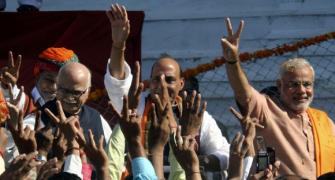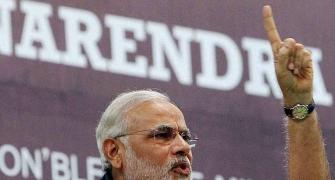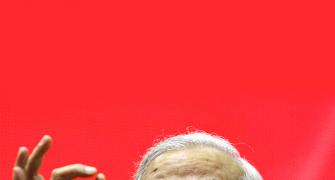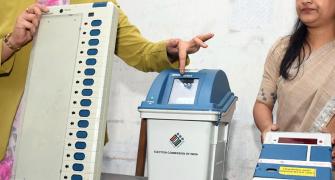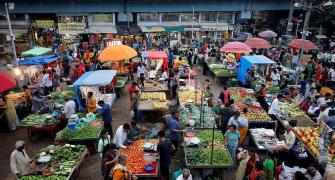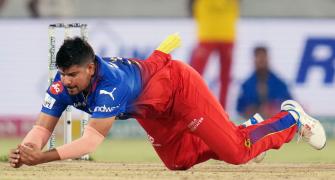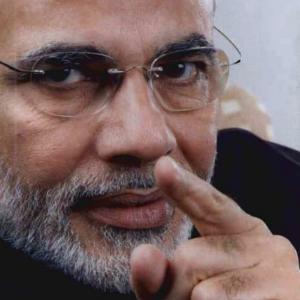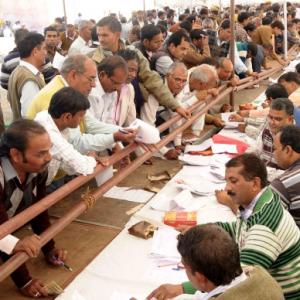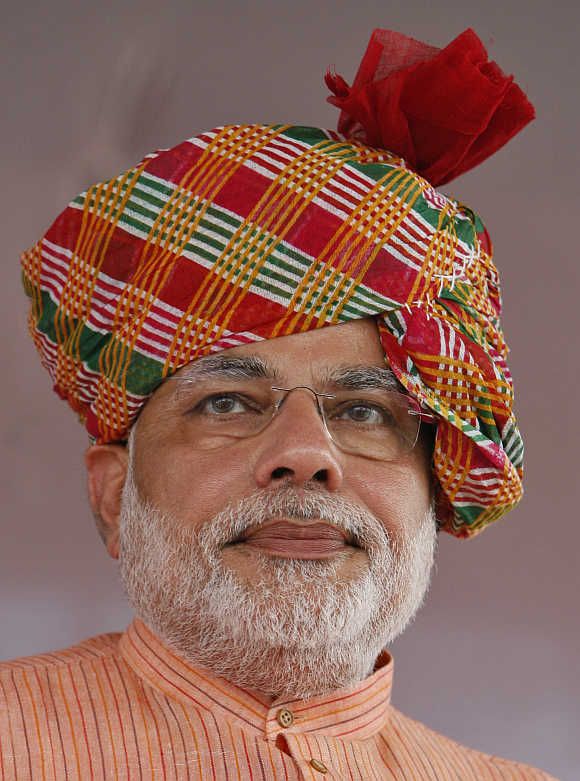 While Narendra Modi is the talisman of his party, it is still not certain if he can claim this space among the people of India, says Seema Mustafa.
While Narendra Modi is the talisman of his party, it is still not certain if he can claim this space among the people of India, says Seema Mustafa.
The votes have been cast and the results are awaited. The exit pollsters are out with their predictions giving sufficient fodder for the 24-hour television news channels to chew on.
There is little attempt by the media to judge the situation for itself, by sending out reporters into the field, and making sense of the nonsense that seems to have replaced the business of news gathering entirely.
Reporters no longer mix with the common man and try to find answers to basic questions as to why polling was so high in states like New Delhi, who were the new voters, why were they so mobilised, and then if possible, who did they vote for.
This would reveal trends and give an insight into the voters's minds that would prove valuable in analysing the election results.
But no, this is no longer is how news is collected and understood. We want quick fix solutions, and in this desperate competitiveness, want answers even before the votes have been counted.
Any serious journalist will point out that all that is possible before the counting is a sense of the trends, the voting patterns of certain sections like the youth who seem to have taken enthusiastic part in polling in Delhi, and a general idea of the issues that worked, and those that did not.
As a result, the predictions in closely fought contests such as Delhi and Chhattisgarh, the margins of error remain real, but instead of warning of this and discussing the reasons for the close contest, the media takes the easy way out by presenting pre-poll results as a virtual fait accompli.
It is important thus, to point out a few trends that seem to be emerging from the elections at this stage. One, while Bharatiya Janata Party leader Narendra Modi is the talisman of his party, it is still not certain whether he can claim this space insofar as the people of India are concerned.
Despite his whirlwind, highly publicised campaigns across the states, he has not been able to generate a wave where all else is vanquished, as clearly the BJP was hoping for.
The contests remain real and fairly tough in states like Delhi and Chhattisgarh, with the Congress registering a mark even in Madhya Pradesh where the BJP seems to be ahead. It is also clear that the state leadership counts for a great deal, and if the voters stay with the BJP in MP it will be largely of the work done by Chief Minister Shivraj Singh Chouhan there.
In Rajasthan, the vote seems to be favouring the BJP's Vasundhara Raje who by all accounts has been camping there, and working hard to swing the tide against incumbent Ashok Gehlot. Modi might have been an add on, but certainly not the vote swinger in these states.
This becomes apparent when the answer to the question: Would the BJP have secured Madhya Pradesh and Rajasthan without Modi, becomes a 'yes'.
More so because of the inability of the Congress to provide an effective opposition in the five years of BJP rule in Madhya Pradesh, and the party's failure to provide good governance in Rajasthan.
Chhattisgarh seemed at one stage to be favouring the Congress, according to reports from journalists who had actually travelled in the state. The neck to neck battle is registered by the exit polls and even if the BJP carries the day at the end, a close fight will again stand testimony to the fact that Modi was not able to generate a wave in the party's favour in this state as well.
The voters are now too seasoned to be enthused by magic wands, and clearly cast the vote with considerable thought and consideration. If the contest is as close as predicted, it can go either way when the results come out.
Delhi became the most interesting battlefield in these polls, simply because it broke away for the first time since its inception as a state from the Congress versus BJP pattern.
The emergence of the Aam Aadmi Party has been particularly significant for a city that has always decried third alternatives, with the middle and upper-class actually rooting for a two party system at the Centre.
The scepticism with which Arvind Kejriwal and his rag-tag band of supporters were regarded by the city seemed to turn into overwhelming support as polling day approached. The BJP and the Congress, that were dismissive of the new party, started taking it seriously when it became apparent that it was eating into both their votes.
The slum dwellers moved away from the Congress towards the AAP while the youth embraced the new party with visible enthusiasm.
This became a groundswell on the day before polling, making it clear that the party was going to be a major factor in the polls as the support had increased, and not shifted as many had expected.
The party may or may not win elections, but if it gets a sizeable share of the seats as seems more than likely, it will carry several messages.
One, middle-class Delhi is looking at change and governance, and is fed up with both the Congress and the BJP despite their 'stability' appeal.
Two, there is a mood even amongst the more exclusive middle-class to give a third party a chance.
Three, Modi might have to re-think his strategy as clearly he has been unable to generate a wave in what he regarded as his key constituency, the middle-class.
Four, there is undeclared zero tolerance for corruption within the electorate that is fed up with price rise and non-governance.
And last, if Delhi fails to be moved by its two favourite political parties like the BJP and the Congress, the future of these two in states with more efficient regional parties remains under a big question mark.

